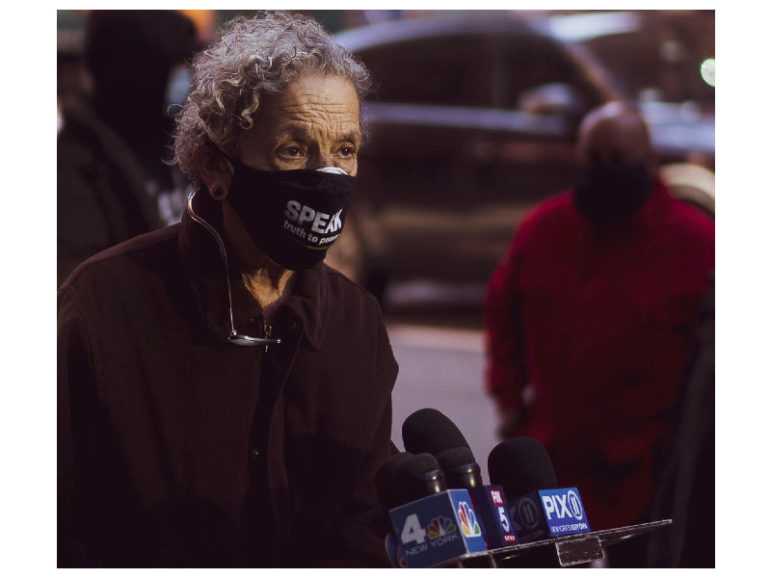‘We are not a gated community—we welcome everyone from all different backgrounds, colors and faiths. Living through the pandemic here has only underscored that reality, and it’s why I’ve been fighting to keep the un-homed residents of the Lucerne Hotel here on the Upper West Side.’

Courtesy of Ruth Messinger
The author, former Manhattan Borough President Ruth Messinger, at a rally in support of Lucerne Hotel residents last weekend.I have called the Upper West Side home for most of my life. What I love about living here is that it is a diverse neighborhood where so many residents reach out and take care of each other, including the most vulnerable. We are not a gated community—we welcome everyone from all different backgrounds, colors and faiths. Living through the pandemic here has only underscored that reality, and it’s why I’ve been fighting to keep the unhomed residents of the Lucerne Hotel here on the Upper West Side.
When the pandemic hit New York City, some of us were lucky enough to have a roof over our heads, food on the table, our health and the health of our families. Others are not so lucky. Those who found themselves without a home were bounced around from shelter to shelter, with no stability in sight. Some contracted COVID-19 and almost died. Others mourned the loss of loved ones. When they finally reached the Lucerne Hotel, not far from my home, many breathed a sigh of relief—but not for long.
 CityViews are readers’ opinions, not those of City Limits. Add your voice today!
CityViews are readers’ opinions, not those of City Limits. Add your voice today!
Opposition started to crop up from a small minority who did not take the time to pose questions or engage in constructive discussion. They lawyered up. They made wrongful claims suggesting that crime on the Upper West Side had risen or that incidents of drug and alcohol use had gone up. This is simply false. Project Renewal, the nonprofit running the shelter, has instead experienced far fewer drug and alcohol incidents at the Lucerne than previously in the shelter, and crime in the neighborhood overall is down. These are wins – for the neighborhood and for the residents of the Lucerne, some of whom have even found and been able to move into permanent housing over the course of their roughly five months on the Upper West Side, and some of whom are starting jobs here.
Many of the complaints the opponents made and the photographs they show are in fact of the street homeless who have been on the Upper West Side for years, not of the Lucerne or other hotel shelter residents in the neighborhood. This only points to the ways our city continues to fail at meeting the needs of unhomed, vulnerable New Yorkers. It doesn’t mean we should kick out the men of the Lucerne, who are thriving.
The residents there are now receiving six-day-a-week services on-site from Project Renewal’s Recovery Center, which provides intake, occupational therapy, and group meetings. They wouldn’t get these services anywhere else. This is on top of the robust case management, nursing, and wellness programs offered by Project Renewal’s nearly 100 on-site staff members, and supplemental programming offered in partnership with local organizations and volunteers, such as walk and talks with faith leaders, resume workshops, and community donation events. And, as of Friday, the men started their jobs with Goddard Riverside’s Green Keepers, cleaning up the neighborhood and learning horticulture. Moving these men again—some for the third or fourth time—makes zero sense, especially as the country gears up for a second wave of COVID-19.
For more than two decades, I was privileged to serve in city government, first as a councilmember on Manhattan’s west side and then as borough president, before going on to work on international human rights as president of American Jewish World Service. For even longer, I’ve been an Upper West Side resident and active community member—caring for and engaging with all that come here, whether to visit, live, or seek shelter. We don’t help people by building neighborhoods with walls around them. We don’t help people find permanent shelter and stability by using them—as Mayor de Blasio has done—as pawns, shifting them around with no clear reason or plan.
On Monday, a judge will decide whether or not these men can stay at the Lucerne until the pandemic ends. Let’s end this drawn out game of table tennis once and for all.
Ruth Messinger was privileged to represent the west side and then the borough of Manhattan in city government from 1977-97. She ran American Jewish World Service for 20 years and now does global and local social justice work including at the Center for Social Responsibility at the JCC.









3 thoughts on “Opinion: Ping-Pong is a Competitive Sport, Not a Way to Treat the Unhomed”
Robberies are up 18.8% and burglaries up an astounding 101.6% in the 20 Precinct compared to last year. Messenger doesn’t know what she’s talking about.
https://www1.nyc.gov/assets/nypd/downloads/pdf/crime_statistics/cs-en-us-020pct.pdf
3 men overdosed at the Lucerne Hotel and died.
How out of touch is Ruth regarding this situation.
FACTS – use them Ruth!
In her world ‘wokeness’ is more important than facing the facts.